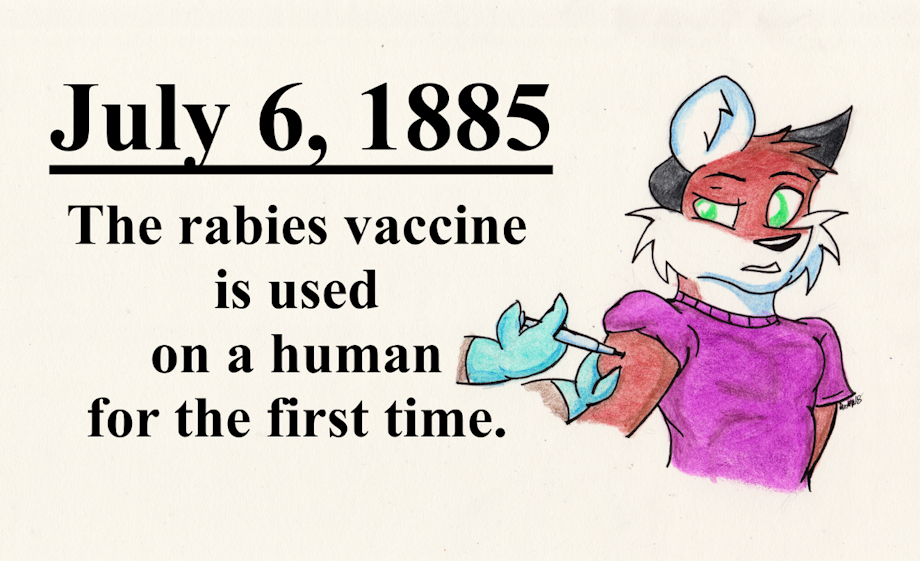On July 6, 1885, the rabies vaccine is administered to a human patient for the first time. The vaccine, developed by French biologist and chemist Louis Pasteur and French physician and immunologist Pierre Paul Émile Roux, utilized spinal tissue from deceased rabbits that been infected with the rabies virus. After having been used successfully to treat infected dogs, the vaccine was used to treat a a nine year old boy named Joseph Meister who had been mauled by a rabid dog. The treatment succeeded in preventing young Meister from contracting the disease and quickly resulted in an effective treatment for a disease which had previously been a death sentence for individuals who contracted it.
In 1887, Pasteur and his associates formed the Pasteur Institute, a non-profit foundation which continues to study and combat infectious diseases to the modern day. Pasteur served as director until his death in 1895. Louis Pasteur received numerous awards and decorations for his work, including the Brazilian Order of the Rose, the Albert Medal from Britain's Royal Society of Arts, Order of the Medjidie from Ottoman Sultan Abdul Hamid II, the Leeuwenhoek Medal from the Royal Netherlands Academy of Arts and Sciences, and the Legion of Honor from France.
Roux continued his research in the fields of bacteriology and immunology. At the Pasteur Institute, he would establish the first regular course on microbiological technique. Roux also dedicated his time to research numerous diseases such diphtheria, syphilis, tetanus, pneumonia, and tuberculosis. Pierre Paul Émile Roux passed away in 1933.
Meister would grow up to become a caretaker at the Pasteur Institute. He committed suicide there shortly after the Nazi occupation Paris. While myth claims that he did so out of defiance against the German occupiers, no evidence exists to support such a claim.
Initially being administered through a series of rather painful injections through the stomach, modern developments in rabies vaccines allow for it to be injected into the arm. Vaccination must be administered as soon as possible. Once an individuals exhibits symptoms of infection, the odds of survival become slim. However, vaccination as soon as possible following possible contraction of the virus greatly reduces the likelihood of infection. It is also recommended that individuals who are at a greater risk of exposure, such as veterinarians, receive the vaccine as well.
Keywords
male
1,209,271,
fox
250,156,
vulpine
36,758,
this day in history
248,
tdih
244,
vaccine
69,
rabies
40,
vaccination
21,
louis pasteur
2,
pasteur
2,
july 6
1,
rabies vaccine
1
Details
Published:
6 years, 11 months ago
07 Jul 2018 00:01 CEST
Initial: 50c1b1f5cae8c17d621fe406264e3fa2
Full Size: 78f584812a7fdff521d30965a674bb05
Large: d7791a25107eff174b3335db99cc9fa8
Small: 1f4cb2d7dde1655632a0fc3f2b323b61
Stats
40 views
8 favorites
2 comments
